Scholarship Spotlight
-(2).png)
At the College of Arts, Social Sciences and Humanities, faculty are the cornerstone of our academic community, and their research is vital to our intellectual vibrancy. However, the broader impact of our work often remains within our own circles. To foster a community of colleagues, enhance cross-college (and University) communication, and highlight the remarkable work being done, we are pleased to introduce the CASSH Scholarship Spotlight series.
What is the CASSH Scholarship Spotlight?
Held on the third Wednesday of each month during lunchtime, the CASSH Scholarship Spotlight features two concise presentations: one from a faculty member and another from a graduate student from a different department. These presentations may include works-in-progress, conference papers, or overviews of larger projects tailored for a general multidisciplinary academic audience.
Event Format
Each Spotlight Event lasts approximately 60 minutes with a 20-minute presentation by a faculty member and a 20-minute presentation by a graduate student, followed by an engaging discussion between the speakers and audience members.
Location: All events take place in the John C. Pace Library's multi-purpose room on the second floor.
Join Us: This is an excellent opportunity to connect with colleagues across disciplines, share your work, and engage in enriching conversations. We encourage all faculty and graduate students to consider presenting and attending these events to celebrate the innovative research happening within our community. Join your colleagues. Join the conversation.
2025-2026 Calendar
September 17, 2025 (12-1 pm) Library Multipurpose Room
October 15, 2025 (12-1 pm) Library Multipurpose Room
November 19, 2025 (12-1 pm) Library Multipurpose Room
January 21, 2026 (12-1 pm) Library Multipurpose Room
February 18, 2026 (12-1 pm) Library Multipurpose Room
March 25, 2026 (12-1 pm) Library Multipurpose Room
Upcoming Spotlights
Please check below for information on our upcoming Scholarship Spotlight Events.
February 2026 Scholarship Spotlight
Dr. Nicholas Hasan Buker
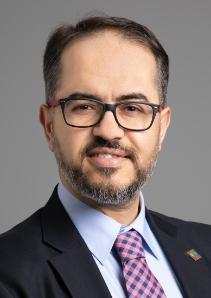
Dr. Mudasir Mustafa
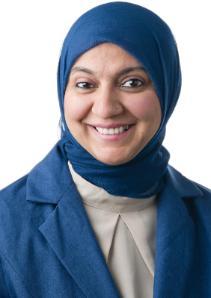
January 2026 Scholarship Spotlight
Our January Scholarship Spotlight brings together two creative explorations of how animals help us understand—and influence—the world around us. From the playful, subversive lens of contemporary art to the strategic use of digital storytelling in nonprofit communication, this month’s presenters examine how animals function as symbols, companions, and catalysts for deeper cultural conversations. Whether in a sculptural installation or an online adoption campaign, animals reveal the ways we construct meaning, build community, and imagine more empathetic futures.
Carrie Fonder
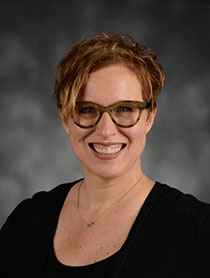
Nikki DeSlatte
-(2).png)
Past Spotlights
Please see information about Past Scholarship Spotlight events below.
November 2025 Scholarship Spotlight
Thank you to everyone who joined us for our November Scholarship Spotlight. We had an engaged audience of faculty, staff, and students who gathered to explore two compelling presentations centered on the sea, its power, its history, and its enduring influence on global affairs. The session sparked lively discussion and highlighted the depth of scholarship across CASSH and our campus partners.
Dr. Brian Crisher
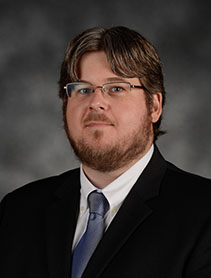
Reubin O'D. Askew Department of Government
Anchors Aweigh (Again): The Global Resurgence of Naval Power
Dr. Della Scott-Ireton
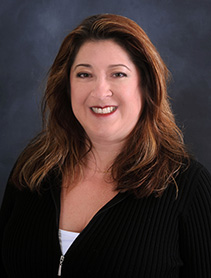
Associate Director for the Florida Public Archaeology Network
Battle for Saipan World War II Maritime Heritage Trail
October 2025 Scholarship Spotlight
The October 2025 CASSH Scholarship Spotlight brought together the art of performance and the history of storytelling, highlighting how theatre, across centuries, continues to connect communities through creativity and craft.
Marci Duncan, Director of the Acting BFA Program in the Department of Theatre, shared insights from directing Steel Magnolias, reflecting on how humor, love, and loss still resonate with audiences more than 20 years after the play’s debut. She discussed the challenges and joys of training students to embody characters older than themselves and to balance the nuances of a story set in a specific time and place. “I truly enjoyed sharing the world I love with others,” she said. "The Scholarship Spotlight is such a wonderful opportunity to bring together diverse voices and experiences from across campus to learn, connect, and celebrate our work.”
Dr. Katie Blankenau, assistant professor in the Department of English, explored how food metaphors in 16th- and 17th-century British plays shaped the relationship between playwrights, performers, and audiences. Her talk revealed how early actors, particularly those performing prologues and epilogues, often earned their “meal tickets” through wit, humor, and the ability to engage audiences both intellectually and socially. “I loved how our presentations showcased the work that goes into making the theater a welcoming space, both in the early modern period and today,” she noted.
Together, their talks illuminated how the power of performance—whether on the Elizabethan stage or in a modern university theater—continues to foster empathy, connection, and creative collaboration within the CASSH community.
Marci Duncan
-211x278.JPG)
Department of Theatre
Steel Magnolias: Strength and Sisterhood on Stage
Marci Duncan, Director of the Acting BFA Program, takes us behind the scenes of Steel Magnolias, sharing her directorial approach to a play that has resonated with audiences for more than 20 years. She explores how humor, love, and loss weave together to celebrate resilience, friendship, and the power of community.
Dr. Katie Blankenau
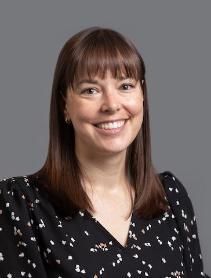
Assistant Professor, Department of English
To eat by the stage: Consuming plays in the early modern entertainment economy
Dr. Katie Blankenau, assistant professor in the Department of English, examines how food metaphors in 16th- and 17th-century British plays shaped the relationship between playwrights, performers, and their audiences. By examining prologues and epilogues, she reveals how theater was consumed, both literally and figuratively, tracing evolving ideas about community in the early modern entertainment marketplace.
September 2025 Scholarship Spotlight
September's Scholarship Spotlight highlighted two fascinating research projects that bridged anthropology, archaeology, maritime studies, and early colonial commerce. This session dove deeply into the cultural and economic exchanges that shaped the Gulf South, from the complexities of French Louisiana trade to the earliest evidence of domestic cats aboard 16th-century Spanish ships. See more from each speaker below.
Dr. John Bratten
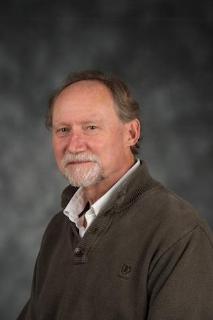
Professor of Anthropology, UWF
Presentation: Tales of Tails: Uncovering America’s Earliest Domestic Cats from a 16th-Century Spanish Shipwreck
Dr. Bratten shared new findings from the Emanuel Point II shipwreck, part of the 1559 Spanish colonization attempt in Pensacola Bay. His research centers on the earliest evidence of domestic animals in what is now the United States, particularly two cats whose remains were recovered from the site. Through isotopic analysis, Dr. Bratten offered intriguing insights into early shipboard life and the dietary habits of these feline passengers during Spanish exploration and colonization.
Kyle Williams
-(1)-213x320.jpg)
Graduate Student, Department of History
Presentation: Trade and Commerce in French Louisiana: 1699–1763
Kyle Williams explored the development of trade and commerce in 18th-century French Louisiana, analyzing how colonial policies, geography, and relationships with Indigenous nations shaped the region’s economic system. Drawing on archival sources and trade records, his research highlighted the unique cultural blending and political alliances that allowed French Louisiana to thrive as both a frontier colony and a vital hub in global trade networks.
March 2025 Spotlight
March's Scholarship Spotlight discussed faith, freedom, and the foundations of religious identity with Dr. Melissa Dow, Reubin O'D. Askew Department of Government, and Grace Maxwell, Department of English.
On Wednesday, March 26, 2025, Dow and Maxwell explored the intersections of law, faith, and personal narrative in early American history.
Dr. Melissa Dow examined the role of religious tests in early state constitutions, revealing how post-1787 legal shifts impacted public office eligibility. Grace Maxwell delved into Mary Rowlandson’s captivity narrative, analyzing themes of suffering, divine purpose, and religious resilience in Puritan New England.
The speakers and attendees engaged in a thought-provoking discussion on the evolving role of faith in governance and personal identity.
Dr. Melissa Dow
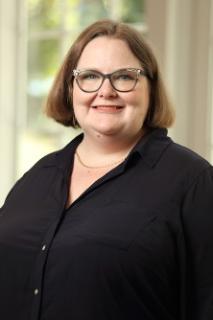
Melissa Dow, Reubin O'D. Askew Department of Government
Religious Tests in Early State Constitutions
Although the US Constitution prohibits the use of a religious test for public office at the federal level, some early state constitutions required officers to pass religious tests in order to hold state office. These tests could be as simple as swearing an oath or affirmation in the name of God, or as detailed as requiring officeholders to affirm or renounce specific Christian doctrines. Dow's research examines the language surrounding religious tests in early state constitutions, with a particular eye to the changes in religious tests in the years immediately following 1787.
Grace Maxwell
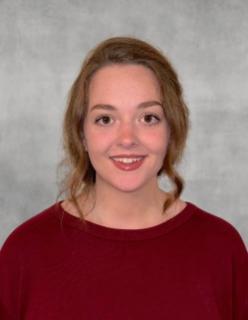
Grace Maxwell, Department of English
Faith Under Fire: Mary Rowlandson's Narrative of Captivity and Restoration
Maxwell's talk explored how Mary Rowlandson’s seventeenth-century captivity narrative, Captivity and Restoration, engaged with notions of suffering and divine purpose. Exploring themes of religious resilience, cultural identity, and the social pressures of Puritan New England, Maxwell's research suggests Rowlandson's narrative serves as both an act of personal spiritual autonomy and a response to societal expectations of religious devotion.
February 2025 Spotlight
February’s Scholarship Spotlight celebrated artistic expression in its many forms—from the emotive power of song to the depth of poetic language.
Dr. Grier Williams School of Music Faculty: Cory McKern, Sheila Dunn, and Blake Riley took us on a musical journey through “Joy” and “Hope,” exploring the human experience through the works of contemporary composers Ricky Ian Gordon and Ben Moore.
Jonathan Fink (Department of English) shared selections from his latest poetry collection, Don't Do It - We Love You, My Heart, offering insights into creativity, artistic inspiration, and the transformative power of language.
The February Spotlight was a dynamic blend of music, poetry, and thought-provoking conversation that showcased the many ways art helps us interpret, celebrate, and understand the world around us.
Sheila Dunn, Cory McKern, and Blake Riley
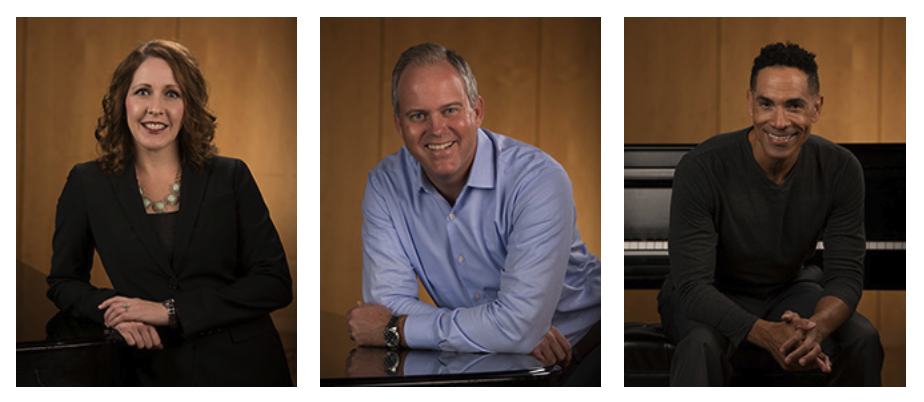
Sheila Dunn, Cory McKern, and Blake Riley, Dr. Grier Williams School of Music
“Joy” and “Hope”: Understanding the Human Experience Through Song
Sheila Dunn, Corey McKern, and Blake Riley performed and discussed works by contemporary composers Ricky Ian Gordon and Ben More. Through Gordon's settings of Langston Hughes' poetry and Moore's powerful song cycle, this program celebrated the enduring power of joy and hope.
Jon Fink

Jon Fink, Department of English
“Don't Do It - We Love You, My Heart”
Jonathan Fink read from his new collection of poetry, Don't Do It - We Love You, My Heart (Dzanc Books, January 2025), and discussed sources of artistic inspiration and strategies for deepening one's creativity, perception, and artistic expression.
January 2025 Spotlight
The January 2025 Spotlight took us on a journey through the worlds of creativity and tradition, where sacred icons inspire modern artistry and storytelling revealed timeless truths. Marzia Ransom presented "Sacred Art Reimagined," which blended historical devotion with contemporary practices to explore how ancient symbols shape her creative process. Sara Schoch uncovered "Why We Continue to Hold the Mirror to Nature," showing how storytelling reflects societal values and deepens our understanding of humanity. Together, these talks weave a compelling tapestry of art, culture, and the universal threads that bind us all. The event was a thought-provoking exploration of creativity and meaning.
The event was held on January 15, 2025, from 12 to 1 p.m. in the Pace Library Multipurpose Room, second floor, room 215.
Marzia Ransom

Marzia Ransom, Department of Art and Design
“Sacred Art Reimagined: An Artist's Journey Through Religious Icons, Objects of Devotion, and Altarpieces”
Sedes Sapientiae is a new body of work that explores different mediums and sacred imagery. Marzia Ransom explored the rich connections between Canonical and Apocryphal symbolism and contemporary artistic practices in this talk. Detailing her creative process, Ransom traced her investigation into early Marian cults and how it shaped Sedes Sapientiae from concept to a fully realized work of art.
Sara Schoch
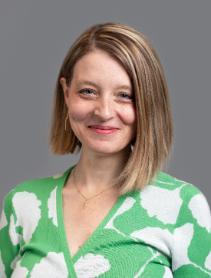
Sara Schoch, Department of Theatre
"Tradition: Why We Continue to Hold the Mirror to Nature"
Drawing from her background as both director and performer, Sara Schoch examined how cultural traditions reflect society while illuminating universal truths about human nature. Her talk explored why artists and storytellers return to familiar narratives even as society evolves, arguing that these repeated stories serve as essential tools for understanding ourselves and our shared human experience.
November 2024 Spotlight
The November 20, 2024, event featured a captivating blend of literary analysis and political science. Dr. Nicholas Mohlmann from the Department of English explored the intersection of conspiracy theories and autobiography in his talk, "Writing Roswell: Conspiracy and Autobiography." By analyzing Lieutenant Colonel Philip Corso’s memoir, The Day After Roswell, Mohlmann examined how personal narratives shape and are shaped by conspiratorial thinking. Following this, Veronica Sigcho Espinoza from the Reubin O'D. Askew Department of Government tackled the political implications of gerrymandering with her presentation, "The Art of Redistricting: Gerrymandering’s Effect on Representation and Governance." Sigcho Espinoza’s research revealed how disproportionate redistricting undermines democratic representation and governance, urging audiences to consider its far-reaching consequences.
Nicholas Mohlmann

Nicholas Mohlmann, Associate Professor, Department of English
“Writing Roswell: Conspiracy and Autobiography”
This talk used Lieutenant Colonel Philip Corso's 1997 memoir "The Day After Roswell" to think about the sympathies between the rhetorical strategies of conspiracy theory and dominant autobiography. Examining how Corso produces a narrative of his supposed involvement with the dissemination of alien technology recovered from the 1947 crash outside of Roswell, New Mexico, the talk argued that while the Roswell conspiracy is built on autobiographical narratives, autobiography itself relies on a conspiratorial approach to reading.
Veronica Sigcho Espinoza

Veronica Sigcho Espinoza, Reubin O'D. Askew Department of Government
“The Art of Redistricting: Gerrymandering’s Effect on Representation and Governance”
In this talk, Veronica Sigcho Espinoza discussed how Gerrymandering distorts the democratic process, altering electoral outcomes, and undermining legislative effectiveness. By disrupting the relationship between elected officials and their constituents, disproportionate redistricting challenges core principles of political representation. This research assessed how these distortions erode both the quality of representation and the effectiveness of democratic governance.
October 2024 Spotlight
On October 23, 2024, the series turned its focus to the challenges of custodial grandparent-headed households and the surprising role of humor in academic library outreach. Dr. Natalie Goulette from the Department of Criminology, Criminal Justice, and Legal Studies shared findings from interviews with grandparents raising grandchildren in Santa Rosa County. Her presentation, "Not Living Long Enough to Raise Them," highlighted the emotional and logistical hurdles faced by these caregivers, shedding light on a growing yet understudied family dynamic. Meanwhile, Kellie Sparks from the Department of Communication introduced the audience to her ongoing study, "LOL-Worthy Libraries: The Impact of Humor on Academic Library Brand Perception." Sparks examined how playful social media content on platforms like TikTok and Instagram fosters engagement and reshapes how libraries connect with their audiences.
Dr. Natalie Goulette
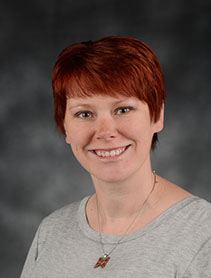
Department of Criminology, Criminal Justice, and Legal Studies
"Not living long enough to raise them,” Exploring the Challenges of Custodial Grandparent-Headed Households in Santa Rosa County
The number of non-traditional households in the US is rising. However, little is known about how these living arrangements impact the caregivers and the children they are raising. While much of the prior literature has focused on the physical and emotional toll raising one’s grandchildren can take on a custodial grandparent, there is still much to explore. This talk explored various characteristics of custodial grandparent-headed households in the Santa Rosa County School District. A total of 17 interviews were completed and covered multiple topics, including reasons for placement, type of custody agreement, and the self-reported challenges respondents experience while raising their grandchildren.
Kellie Sparks

Department of Communication
LOL-worthy Libraries: The Impact of Humor on Academic Library Brand Perception
This study, which was in progress during the time of the presentation, focused on the impact of humorous social media messaging on academic library brand perception. Research on humor and social media advertising is limited within the library and information science field, especially in academic libraries. The significant impact of social media, primarily TikTok and Instagram, has shifted social media strategies within libraries to include more playful, comical content to boost engagement. This study examined how humorous content resonates with library patrons and influences their perceptions of the library, fostering positive relationships with their target social media audience.
September 2024 Spotlight
The inaugural CASSH Scholarship Spotlight event, held on September 18, 2024, explored survival cannibalism at sea and the social intricacies of the ancient Maya. Dr. Amy Mitchell-Cook from the Department of History and Philosophy discussed narratives of shipwreck survivors who justified acts of cannibalism from the 17th to 19th centuries. Her presentation, Who’s Hungry? Survival Cannibalism at Sea examined how these accounts were constructed to rationalize extreme behavior within societal norms. Graduate student Aliana Schwartz from the Department of Anthropology then transported the audience to ancient Honduras with her research, Biting into the Past: How Teeth Illuminate Maya Social Structures. By analyzing dental markers of developmental stress, Schwartz revealed how social hierarchies influenced the health and resilience of Copan residents during the Late Classic Period. Together, their presentations demonstrated how historical and archaeological research can illuminate the complexities of human survival and social organization.
Dr. Amy Mitchell-Cook
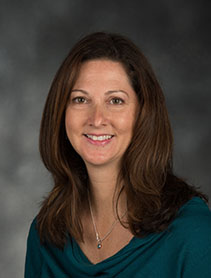
Department of History & Philosophy
Who’s Hungry?: Survival Cannibalism at Sea
From the 17th to the 19th century, several published narratives related that survivors of shipwrecks turned to cannibalism. However, rather than describe them as random acts of murder or savagery, these accounts went to great lengths to justify cannibalism. Instead of hiding their actions, survivors described the process of how cannibalism occurred and why certain individuals lived while others became necessary sustenance. This talk explored how this process unfolded and how narratives justified the act to those on land.
Aliana M. Schwartz, Graduate Student
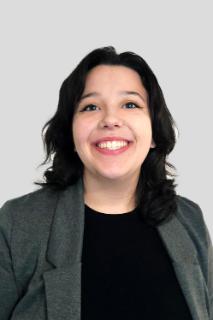
Department of Anthropology
Biting into the Past: How Teeth Illuminate Maya Social Structures
Located along the Western border of Honduras, the ancient Maya city of Copan nurtured a highly complex, socially dynamic society that reached its height during the Late Classic Period (AD 600-AD 820). Aliana M. Schwartz,'s Graduate Student research considers how Maya social structures impacted the health of Copan residents. By examining markers of developmental stress on their teeth, I seek to understand how individuals’ positions within society enable or prevent them from building resilience in response to disease, malnutrition, and other challenges.
Interested in Presenting?
Email Dr. Jamin Wells at jwells2@uwf.edu a brief abstract of your proposed talk and a current CV. Graduate students should also include the name of a faculty reference.






